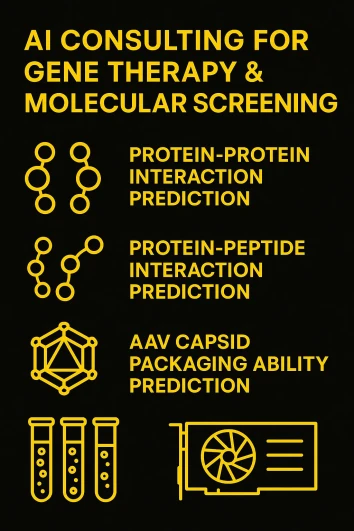
The InvenTide team developed lightweight AI solutions for cutting-edge applications in gene therapy and small-molecule screening. Our collaboration focuses on developing scalable, high-throughput models that dramatically accelerate research and discovery in life sciences.
Our AI tools are powering breakthroughs across several key areas:
What sets our models apart is their efficiency and scalability. Leveraging GPU-powered computation, our AI systems can screen billions of peptides or capsid variants in a matter of days—far outpacing traditional experimental approaches. This speed empowers researchers to explore larger biological spaces, test more candidates, and arrive at better therapeutic solutions faster.
Adeno-associated virus (AAV) capsids, in particular, are at the heart of next-generation gene therapies. Our models help predict and design capsids with higher packaging efficiency and better tissue targeting, unlocking new treatment pathways for rare and previously untreatable diseases.
By combining biological insight with AI precision, InvenTide is helping shape the future of medicine—making gene therapy and peptide-driven drug development more accessible, accurate, and efficient.
Relevant Publication: Topology-Driven Negative Sampling Enhances Generalizability in Protein-Protein Interaction Prediction
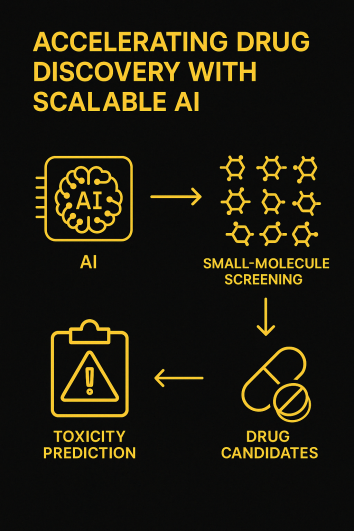
At InvenTide, we build lightweight, scalable AI solutions that transform the landscape of small-molecule screening in drug discovery. Our models are engineered to deliver high-throughput performance while remaining computationally efficient—screening billions of compounds within days using standard GPU infrastructure.
Unlike massive generative AI models that require specialized hardware and high power consumption, our optimized architectures offer unmatched speed and accessibility. This makes our solutions ideal not just for large pharmaceutical companies, but also for research labs and startups aiming to innovate quickly and cost-effectively.
A standout feature of our platform is built-in toxicity prediction. Before a single experiment is run in the lab, our AI models evaluate the safety profiles of candidate molecules—flagging those with potential adverse effects. This early toxicity screening streamlines the discovery pipeline, significantly reducing the risk of costly failures in clinical development.
Our AI tools support both drug repurposing and novel compound discovery, offering a powerful framework for rapidly identifying new treatment candidates for complex diseases. Whether optimizing existing drug libraries or exploring uncharted chemical spaces, our models empower researchers to make smarter, faster decisions.
By fusing speed, precision, and scalability, InvenTide is redefining what’s possible in pharmaceutical R&D. Our work in small-molecule screening exemplifies how AI can be used not just to accelerate research, but to make it more targeted, safer, and ultimately more successful.
Relevant Publication: Improving the generalizability of protein-ligand binding predictions with AI-Bind.
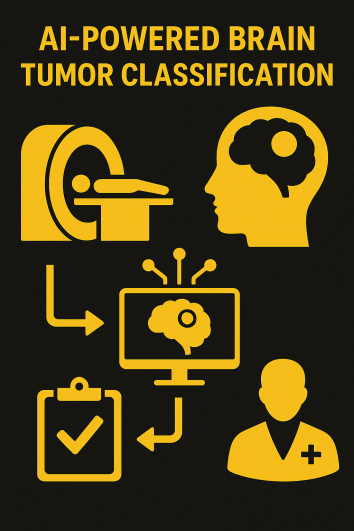
At InvenTide, our team has developed lightweight, high-performance AI models to support clinicians in accurately classifying brain tumors—particularly distinguishing glioblastoma from metastasized tumors. These diagnostic models deliver rapid, high-throughput results without sacrificing accuracy or generalizability.
What sets our solution apart is its robust compatibility across MRI machines from different manufacturers and varying magnetic strengths. Unlike many conventional AI tools that depend on specific imaging setups, our models are designed to adapt, offering reliable diagnostics regardless of equipment variations. This ensures consistent performance in real-world clinical settings.
Built with scalability and practicality in mind, our models require no additional hardware and can be integrated directly into existing clinical infrastructure. Hospitals and diagnostic centers can leverage their current MRI systems to run AI-assisted tumor analysis—transforming routine scans into powerful diagnostic tools.
By reducing diagnostic time and increasing accuracy, our AI models not only streamline clinical workflows but also empower neurosurgeons and radiologists with deeper insights. This leads to faster decision-making and more effective treatment planning for patients facing complex neurological conditions.
This case study highlights how AI, when thoughtfully engineered, can deliver real-world impact—improving healthcare delivery without disrupting existing infrastructure. Our work in brain tumor classification reflects InvenTide’s broader mission: to develop practical, efficient, and scalable AI solutions that bridge cutting-edge technology with meaningful outcomes.
Relevant Publication: SIENNA: Lightweight Generalizable Machine Learning Platform for Brain Tumor Diagnostics.
View Solution View Solution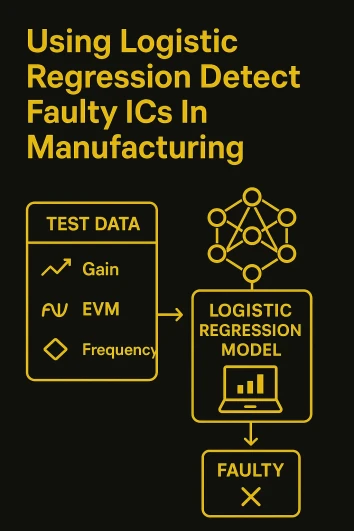
As part of the manufacturing consultancy team, we addressed a key challenge in semiconductor manufacturing: identifying faulty Radio Frequency Integrated Circuits (RFICs) before they are shipped to customers. Traditionally, this process relied on manually setting thresholds and inspecting test parameters such as Gain, Current Consumption, Error Vector Magnitude (EVM), and Frequency Accuracy. However, these methods were often time-consuming and inconsistent, especially at high production volumes.
To enhance accuracy and streamline the process, we implemented a machine learning solution using logistic regression. We began by collecting labeled test data from production—samples of both working and faulty RFICs—along with their associated measurements. Each RFIC had multiple features, including Gain, Current, EVM, and Frequency, which served as inputs for our model.
We trained a logistic regression model to learn from this data and distinguish between good and faulty units. Logistic regression is a straightforward yet effective algorithm for binary classification problems—in this case, predicting whether an RFIC should pass or fail.
After validating the model’s performance, we integrated it into our test pipeline. Now, as test data is collected from each RFIC during production, the model automatically evaluates it and flags any potentially faulty devices. This has enabled faster, more reliable detection of defects, leading to reduced scrap rates, less manual rework, and improved overall product quality.
By combining our domain expertise in RF testing with machine learning, we created a scalable, data-driven solution that enhances decision-making in the production environment. This case study demonstrates how AI techniques like logistic regression can be applied effectively in real-world electronics testing scenarios to drive meaningful operational improvements.
View Solution View Solution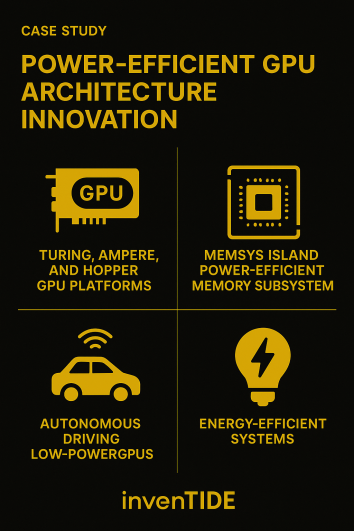
At InvenTide, we bring deep, hands-on experience in cutting-edge hardware design. One of our key team members contributed significantly to GPU architecture development, playing a vital role across three generations of GPU platforms—Turing, Ampere, and Hopper. These architectures have powered some of the most important breakthroughs in artificial intelligence, gaming, and high-performance computing.
Among his most impactful contributions was the development of the memsys island, a novel memory subsystem that dramatically improved power efficiency in GPUs. This advancement became a foundational enabler for large-scale AI workloads, making high-throughput, energy-efficient computing more accessible across industries. The memsys island’s architecture was instrumental in reducing energy consumption without compromising performance—an innovation that continues to support today’s most demanding AI applications.
His work also extended into the field of autonomous driving, where he contributed to the design of low-power, high-performance GPUs used in Tesla’s self-driving platforms. These chips were optimized for real-time inference, allowing autonomous vehicles to process complex sensor data and make decisions with high reliability—all within tight energy budgets.
This case study illustrates our team's rare blend of system-level thinking and practical engineering expertise in AI hardware. Our experience in optimizing power efficiency for mission-critical applications has helped shape the trajectory of AI adoption—from data centers to edge devices.
The architectural innovations developed by our team continue to influence next-generation computing platforms, enabling smarter, faster, and more energy-efficient systems in sectors ranging from transportation to healthcare. At InvenTide, we harness this expertise to deliver AI solutions that are not only powerful but also scalable and sustainable.
His work also extended into the field of autonomous driving, where he contributed to the design of low-power, high-performance GPUs used in Tesla’s self-driving platforms. These chips were optimized for real-time inference, allowing autonomous vehicles to process complex sensor data and make decisions with high reliability—all within tight energy budgets.
This case study illustrates our team's rare blend of system-level thinking and practical engineering expertise in AI hardware. Our experience in optimizing power efficiency for mission-critical applications has helped shape the trajectory of AI adoption—from data centers to edge devices.
The architectural innovations developed by our team continue to influence next-generation computing platforms, enabling smarter, faster, and more energy-efficient systems in sectors ranging from transportation to healthcare. At InvenTide, we harness this expertise to deliver AI solutions that are not only powerful but also scalable and sustainable.
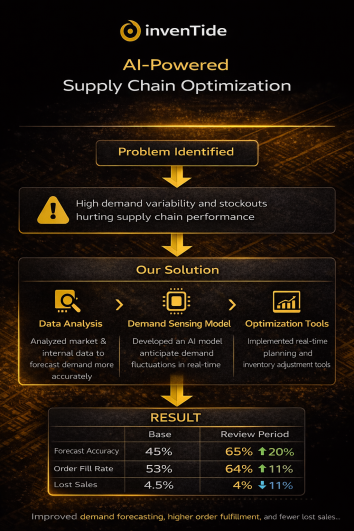
AI Demand Prediction for a Canadian Manufacturer
The client was planning production and purchasing using spreadsheets and “tribal knowledge.” That worked—until it didn’t. Demand spikes around holidays and regional events were causing two expensive problems at the same time:
InvenTide built a demand prediction application that combined historical sales patterns with real-world drivers that were previously ignored.
We started by consolidating and cleaning data sources:
We delivered a production-grade Demand Prediction Application with:
Within the first planning cycles, the client moved from reactive firefighting to proactive planning: